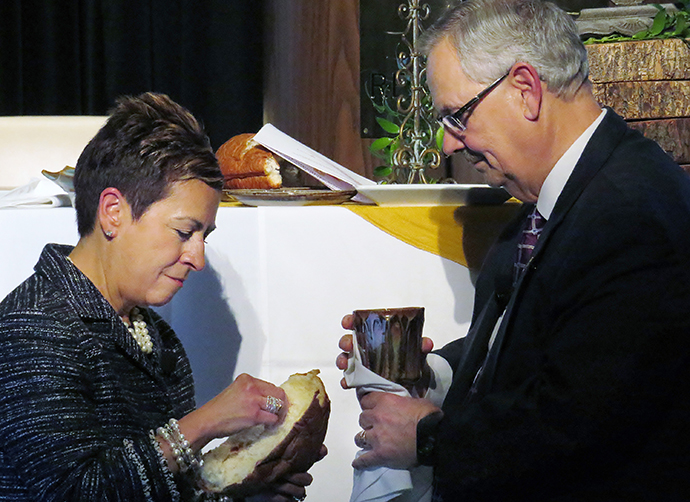Council of Bishops President Bruce R. Ough challenged colleagues to be open to changing their minds as they grapple with how to avoid a breakup of The United Methodist Church over homosexuality.
He noted that the council’s meeting here this week coincides with Lent, a season for reflection and change.
“Let us practice the Lenten discipline of self-emptying, letting go of the positions we came here to defend and the battles we are plotting to wage in this council or the Judicial Council or on the floor of the special General Conference,” Ough said in a Feb. 25 sermon that doubled as a presidential address.
“Let us practice the Lenten discipline of listening to God and one another to the point of dying to ourselves.”
More than 100 active and retired bishops are in Dallas for a special, four-day meeting. It’s focused on refining options presented by the Commission on a Way Forward, a group advising the bishops on how to avoid denominational schism after four decades of division over how accepting the church should be of homosexuality.
Apart from worship and devotional services, the meeting will be behind closed doors, with the bishop moderators of the commission leading discussion on plans that could turn into legislative petitions.
The Council of Bishops has another meeting scheduled for April 29-May 4, the last before the July 8 deadline for petitions to the special 2019 General Conference, in St. Louis.
“We’re running out of time,” Ough said in an interview after his address. “I don’t expect we’re going to be making any final decision or vote at this meeting. But we added this meeting because we know that by the time we get to the April-May meeting, we’ve got to be pretty clear where we’re going.”
The 32-member commission, which last met in January, has suggested three different frameworks for the church’s future.
A traditionalist model would maintain the church’s official stances on homosexuality, which declare the practice of homosexuality incompatible with Christian teaching, preclude clergy from officiating at same-sex unions and prohibit the ordination of self-professed practicing gay clergy.
This model also would emphasize accountability and enforcement of relevant church law.
A centrist model would remove the Book of Discipline’s restrictive language, allowing conferences to decide how inclusive to be, while protecting clergy who could not, as a matter of conscience, perform a same-sex union or support ordination of openly gay clergy.
A third option foresees multiple branches of the denomination sharing a General Conference and certain agency functions. One branch might favor the traditionalist approach, another the centrist, with a third opting for full inclusion of LGBTQ individuals.

Council of Bishops Secretary Cynthia Fierro Harvey and Council of Bishops President Bruce R. Ough share the elements during Holy Communion, part of the Feb. 25 opening worship service for the council’s meeting in Dallas. The bishops will meet through Wednesday, Feb. 28, and will be refining denominational unity options put forward by the Commission on a Way Forward. Photo by Sam Hodges, UMNS.
In Dallas, bishops will likely be refining two of the three models, Ough said. He declined to identify which two.
He said he favors ultimately recommending only one option to the special General Conference.
“If we’re dealing with multiple plans, all of which could be available for amendment or whatever, I think it would simply overwhelm the process,” Ough said.
West Ohio Conference Bishop Gregory V. Palmer, who also serves on the commission, echoed that the Dallas meeting is critical.
“My hope is that the council will focus in more on where it believes it wishes to go,” Palmer said. “It doesn’t have to reach the conclusion this week, but we ought to make progress.”
Ough’s sermon, titled “On Changing Our Minds,” stressed that the apostles and other early church leaders, as well as John Wesley and fellow leaders of the Methodist movement, drew on the Holy Spirit to move beyond “anxious passion for security” and take on the mind of Christ.
United Methodist bishops must now do the same, Ough preached.
The sermon’s other theme was “home,” with Ough sharing how the young Native American woman Sacagawea helped direct the Lewis and Clark expedition into parts of the West, which she knew from having dwelled there with her Shoshone tribe.
“There are hundreds, perhaps thousands, of United Methodist laity and pastors among us who are discovering how to move behind a ʻsingle-story’ narrative or a ʻchurch-dividing’ narrative on human sexuality, while maintaining a clear, theologically grounded, integral sexual ethic and a passionate, effective evangelical mission, particularly to younger generations,” Ough said.
He added: “Friends, they may be our Sacagaweas. They may be our guides home.”
At the end of the sermon, Ough again implored fellow bishops to be attentive to the Holy Spirit and to lead accordingly.
“Let’s help our people empty themselves of their fear of the future and their fear of a changed church. … Let’s be open to Christ changing our minds. Let’s show the world what unity in the Body of Christ looks like. Let’s go home!”
Ough’s address drew sustained applause, and compliments afterwards.
“It was a wonderful way to open our hearts to the presence of the Holy Spirit in this moment,” said California-Nevada Conference’s Bishop Minerva Carcaño. “We all have opinions about the models. This really is about discerning the will of God.”
Hodges, a United Methodist News Service writer, lives in Dallas. Contact him at (615) 742-5470 or newsdesk@umcom.org.
To read more United Methodist news, subscribe to the free Daily or Weekly Digests.
Like what you're reading? Support the ministry of UM News! Your support ensures the latest denominational news, dynamic stories and informative articles will continue to connect our global community. Make a tax-deductible donation at ResourceUMC.org/GiveUMCom.




